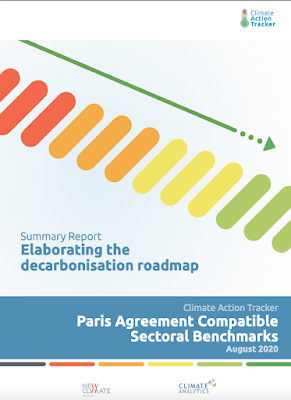 |
| Decarbonisation is needed |
While national emission trends are a useful tool for measuring government progress towards meeting the Paris Agreement 1.5 ̊C temperature limit at a global level, each government will have to address its own sectors, each with their own, different baseline.
What should government sectoral benchmarks be? Will they meet the global carbon budget?
The Climate Action Tracker has defined and analysed a global-level series of Paris Agreement-compatible benchmarks, across four major sectors: Power, Transport, Industry, and Buildings.
Within each sector, we define benchmarks for several separate but complementary indicators.
We have also drilled down to present the benchmarks in these sectors for seven individual countries: Brazil, China, EU, India, Indonesia, South Africa, and the US, taking into account the current technical and infrastructure circumstances in each country.
We have developed the benchmarks for both 2030 and 2050, with additional temporal resolution depending on the approach and indicator. The data from this work has been added to the Climate Action Tracker interactive data portal https://climateactiontracker.org/data-portal.
We have identified the following key lessons:
Decarbonisation by 2050: the Paris Agreement requires the world to decarbonise by2050: on average, all sectors need to decarbonise in this time frame, albeit at slightly different rates.
In this report, we have identified the potential for such rapid
decarbonisation across all sectors.
Differences shrink: in terms of timing, benchmarks differ between countries and sectors,because they all start from a different base. But ultimately, governments must pursue all options in all sectors, and sometimes this will require support between countries."
....................
"Progress by 2030 is important: decarbonisation by 2050 alone is not sufficient; to keep carbon budgets within reach, progress must ramp up well before 2030.
 |
| Decarbonisation |
Industry, transport, buildings need to advance significantly: these sectors are not yet moving as quickly as is necessary, and efforts to meet 2030 benchmarks must significantly ramp up.
 |
| All new buildings from now on in all countries need to be of a high standard and equipped with heating and cooling technologies that either are or can be zero emissions. |
Related:
No comments:
Post a Comment